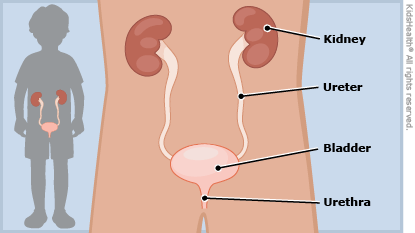A to Z: Urinary Tract Infection (UTI)
May also be called: Cystitis; Pyelonephritis; Bladder Infection; Kidney Infection
A urinary tract infection (UTI) is an infection in one or more of the structures of the urinary tract. UTIs are more common in females.
More to Know
The urinary tract includes the kidneys, ureters, bladder, and urethra. Kidneys filter blood, remove waste and produce urine (pee); ureters carry the urine from the kidneys to the bladder; and the bladder stores the urine until it is eliminated from the body through the urethra.

A UTI can happen anywhere along this tract, but the lower part — the urethra and bladder — is most commonly involved. This is called cystitis. If the infection travels up the ureters to the kidneys, it's called pyelonephritis and is usually more serious.
Most UTIs occur when bacteria infect the urinary tract, but some viruses also can cause an infection. Bacteria aren't normally found in pee, but they can easily enter the urinary tract from the skin around the anus.
UTIs are highly treatable, but it's important to catch them early. Untreated UTIs can lead to kidney damage, especially in kids younger than 6.
UTI symptoms include pain while peeing, frequent urination, low back pain or abdominal pain in the area of the bladder, fever, and foul-smelling urine that may look cloudy or contain blood. UTIs are treated with antibiotics. The antibiotic used and how long it must be taken depend on the type of bacteria causing the infection and how severe it is.
Keep in Mind
Most UTIs are cured within a week with proper medical treatment. Many UTIs can be prevented by changing infants' diapers frequently, encouraging kids to practice good hygiene, and instructing kids not to "hold it" when they have to pee because urine that remains in the bladder gives bacteria a good place to grow.
Some UTIs are caused by a congenital condition called vesicoureteral reflux (VUR) that causes urine to flow from the bladder up the ureters and toward the kidneys. Kids with VUR should follow their doctor's treatment plan to prevent recurrent UTIs.
All A to Z dictionary entries are regularly reviewed by KidsHealth medical experts.
















